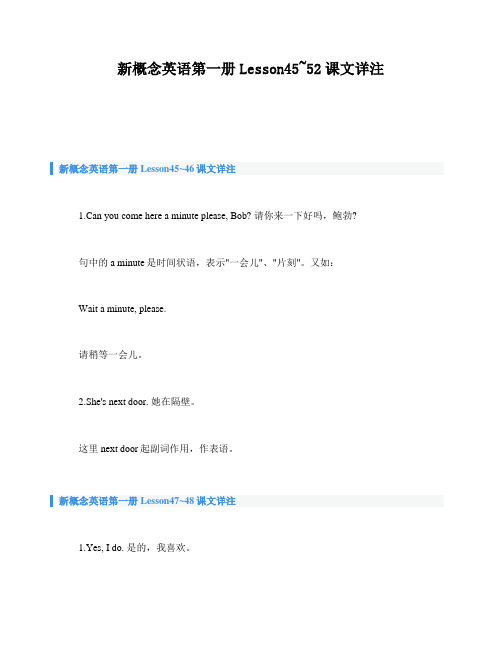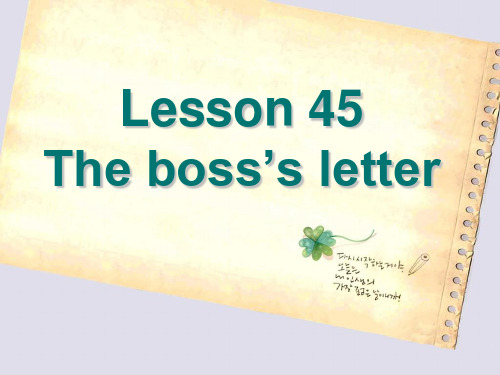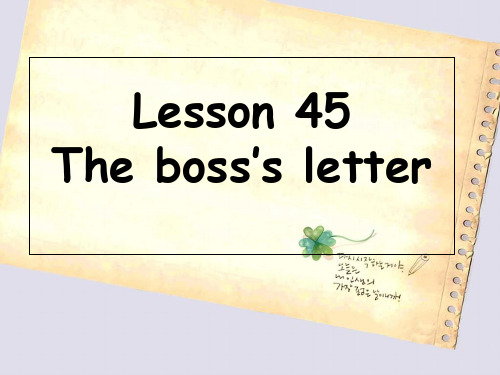新概念英语第一册Lesson45_52课文详注
- 格式:doc
- 大小:16.65 KB
- 文档页数:5

Lesson 45: The boss's letter ⽼板的信Listen to the tape then answer this question. Why can't Pamela type the letter?听录⾳,然后回答问题。
帕梅拉为什么⽆法打信?THE BOSS: Can you come here a minuteplease, Bob?BOB: Yes, sir?THE BOSS: Where's Pamela?BOB: She's next door.She's in her office, sir.THE BOSS: Can she typethis letter for me?Ask her please.BOB: Yes, sir.BOB: Can you type this letterfor the boss please, Pamela?PAMELA: Yes, of course I can.BOB: Here you are.PAMELA: Thank you, Bob.PAMELA: Bob!BOB: Yes?What's the letter.PAMELA: I can't type this letter.PAMELA: I can't read it!The boss's handwriting isterrible!New Word and expressions ⽣词和短语canmodal verb 能够bossn. ⽼板,上司minuten. 分(钟)askv. 请求,要求handwritingn. 书写terribleadj. 糟糕的,可怕的参考译⽂⽼板:请你来⼀下好吗?鲍勃?鲍勃: 什么事,先⽣?⽼板:帕梅拉在哪⼉?鲍勃: 她在隔壁,在她的办公室⾥,先⽣。
⽼板:她能为我打⼀下这封信吗?请问她。


新概念英语第一册Lesson45~52课文详注新概念英语第一册Lesson45~46课文详注1.Can you come here a minute please, Bob? 请你来一下好吗,鲍勃?句中的 a minute是时间状语,表示"一会儿"、"片刻"。
又如:Wait a minute, please.请稍等一会儿。
2.She's next door. 她在隔壁。
这里 next door起副词作用,作表语。
新概念英语第一册Lesson47~48课文详注1.Yes, I do. 是的,我喜欢。
是一句肯定的简略回答。
如果是否定的回答,则应为No, I don't. I like…和 I don't like…这两个句型是分别表示"我喜欢/想要……"和"我不喜欢/想要……"的惯常用法。
2.black coffee, 不加牛奶或咖啡伴侣的清咖啡。
加牛奶的咖啡叫 white coffee. black在有些搭配中不译为黑色的,如:black tea 红茶3.序数词 1st~12th1st----first 2nd----second 3rd----third4th----fourth 5th----fifth 6th----sixth7th----seventh 8th----eighth 9th----ninth10th----tenth 11th----eleventh 12th----twelfth英语中序数词必须与定冠词(the)连用。
虽然有时不在形式上表现出来,在朗读的时候也必须加上the。
如:the 1st month (第1个月),the twelfth century(12世纪)。
新概念英语第一册Lesson49~50课文详注1.What about some steak? 来点牛排吗?句中What可以换成How,用来征求对方看法或意见。



Lesson45- Lesson46Part1: 麻辣单词★can [kæn] modal verb 能够【搭配】can’t=can notcan not but 禁不住,不由得can but 只得,只能……罢了例如:1. Can I ask you out for dinner tonight?今晚能与我共进晚餐吗?2. I can’t believe this! I didn’t make it!让人难以置信!我竟然没成功!★boss [bɔs]n.老板,上司【补充】bossy adj.专横的例句:He cannot stand his boss. 他受不了他的老板。
★ask [ɑ:sk]v.请求,要求【搭配】ask sb. to do sth. 让某人做某事ask (sb.) for sth. 请求;恳求(给予)ask for a leave 请假ask for trouble 自讨苦吃,自找麻烦例句:1. I asked him his name. 我问了他的名字。
2.You can ask Mary to go with you.你可以请求玛丽和你一起去。
3.Ask him for help 请求他帮助★minute ['minit] n.分(钟)【搭配】(at)any minute 马上,随时in a minute 立刻a last-minute person 临时抱佛脚的人例句:Do you have a minute?你有一分钟时间吗?★handwriting ['hænd,raitiŋ]n.书写例句:Is this your handwriting? 这是你的笔迹吗?★terrible ['terəbl]adj.糟糕的,可怕的【补充】terribly adv.可怕地;十分,极其have a terrible time 过得极不愉快例句:It’s so terrible! 真糟糕!★ lift [lift]v.拿起,搬起,举起 【补充】 n. 电梯go by lift 乘电梯上去lift one’s head 抬起头lift up one’s ears 竖起耳朵听例句: I can lift this table. 我能举起这个桌子。
【导语】新概念英语作为家喻户晓的经典之作,它有着全新的教学理念,有趣的课⽂内容及其全⾯的技能训练,为⼴⼤的英语学习者提供帮助!如果你也想学好英语,⼜怎能错过新概念英语?下⾯⽆忧考为您提供了相关内容,希望对您有所帮助!新概念英语第⼀册课⽂翻译及学习笔记Lesson45~46 【课⽂】 THE BOSS: Can you come here a minute please, Bob? BOB: Yes, sir? THE BOSS: Where's Pamela? BOB: She's next door. She's in her office, sir. THE BOSS: Can she type this letter for me? Ask her please. BOB: Yes, sir. BOB: Can you type this letter for the boss please, Pamela? PAMELA: Yes, of course I can. BOB: Here you are. PAMELA: Thank you, Bob. PAMELA: Bob! BOB: Yes? What's the matter. PAMELA: I can't type this letter. PAMELA: I can't read it! The boss's handwriting is terrible! 【课⽂翻译】 ⽼板:请你来⼀下好吗?鲍勃? 鲍勃:什么事,先⽣? ⽼板:帕梅拉在哪⼉? 鲍勃:她在隔壁,在她的办公室⾥,先⽣。
⽼板:她能为我打⼀下这封信吗?请问她。
鲍勃:好的,先⽣。
鲍勃:请你把这封信给⽼板打⼀下可以吗,帕梅拉? 帕梅拉:可以,当然可以。
鲍勃:给你这信。
帕梅拉:谢谢你,鲍勃。
帕梅拉:鲍勃! 鲍勃:怎么了?怎么回事? 帕梅拉:我打不了这封信。
新概念英语第一册Lesson45~52课文详注
【导语】新概念系列教材的经典早已不言而喻。
其文章短小精悍,语句幽默诙谐,语法全面系统,历来被公认为是适合大多数中学生课外学习的资料之一。
小编为您整理了以下内容,仅供参考。
希望可以帮助到您!如果您想要了解更多相关内容,欢迎关注小编!
新概念英语第一册Lesson45~46课文详注
1.Can you come here a minute please, Bob? 请你来一下好吗,鲍勃?
句中的 a minute是时间状语,表示"一会儿"、"片刻"。
又如:
Wait a minute, please.
请稍等一会儿。
2.She's next door. 她在隔壁。
这里 next door起副词作用,作表语。
新概念英语第一册Lesson47~48课文详注
1.Yes, I do. 是的,我喜欢。
是一句肯定的简略回答。
如果是否定的回答,则应为No, I don't. I like…和 I don't like…这两个句型是分别表示"我喜欢/想要……"和"我不喜欢/想要……"的惯常用法。
2.black coffee, 不加牛奶或咖啡伴侣的清咖啡。
加牛奶的咖啡叫 white coffee. black在有些搭配中不译为黑色的,如:
black tea 红茶
3.序数词 1st~12th
1st----first 2nd----second 3rd----third
4th----fourth 5th----fifth 6th----sixth
7th----seventh 8th----eighth 9th----ninth
10th----tenth 11th----eleventh 12th----twelfth
英语中序数词必须与定冠词(the)连用。
虽然有时不在形式上表现出来,在朗读的时候也必须加上the。
如:the 1st month (第1个月),the twelfth century(12世纪)。
新概念英语第一册Lesson49~50课文详注
1.What about some steak? 来点牛排吗?
句中What可以换成How,用来征求对方看法或意见。
请参看第31-32课_Where's Sally?课文详注。
2.to tell(you) the truth, 老实说,说实话。
它常用于句首,作句子的附加成分,表示说话人对所说话语的态度:
To tell you the truth, I don't like his new car at all.
给你讲实话,我一点儿也不喜欢他的那辆新车。
3.序数词13th~24th
13th----thirteenth 14th----fourteenth 15th----fifteenth
16th----sixteenth 17th----seventeenth 18th----eighteenth
19th----nineteenth 20th----twentieth 21st----twenty-first
22nd----twenty-second 23rd----twenty-third 24th----twenty-fourth
新概念英语第一册Lesson51~52课文详注
1.Where do you come from? 你是哪国人?
问对方是什么地方人。
come from表示来源或籍贯。
也可说:Where are you from? 在第7课中出现过类似的句子。
2.What's the climate like in your country? 你们国家的气候怎么样?
句中like是介词,不是动词,它的宾语是 What。
又如:What's the weather like in spring? climate指某一地区数年间的天气情况;weather是指某个特定的时间内晴、雨、风、雪变化。
对于这类问题的回答可以是 It's very pleasant(很好)或 It rains sometimes(有时下雨)。
这里的it均指天气。
3.It's often windy in March. 3月里常常刮风。
表示在某个月份里通常用介词in。
类似用in的时间短语课文中还有 in April(在4月),in June(在 6月),in September(在 9月)等等。
often(经常),always(总是,老是),sometimes(有时)都是课文中出现的表示非确定频度的副词。
这些副词一般用来回答用how often 提问的问题。